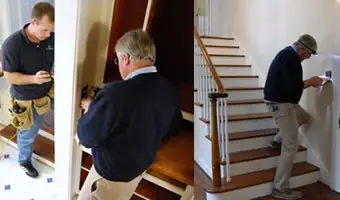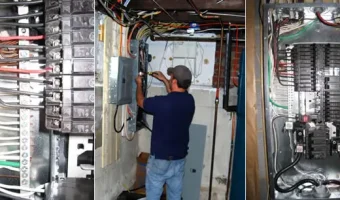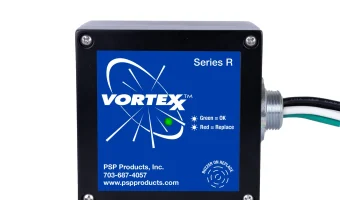When you’re diving into the joys of pool ownership, it’s not just about those sunny afternoons splashing around—there’s also a crucial side that often stays in the background: electrical installations. If you’ve ever clicked on a video demonstrating a spectacular pool party, chances are you didn’t see the behind-the-scenes work ensuring everything runs smoothly and safely. Having the right electrical setup isn’t just a luxury; it’s a necessity for both enjoyment and safety. Don’t let lighting issues or faulty wiring ruin your fun! This article will guide you through what you need to know about pool electrical installations in Spring Hill, FL, and how to hire trustworthy professionals who won’t leave you high and dry.
When seeking pool electrical installation services in Spring Hill, FL, it is crucial to choose a licensed and experienced electrician who understands local zoning laws and safety regulations. Additionally, ensure they have a solid reputation for quality work and can provide a detailed estimate covering all aspects of the installation, including wiring, lighting, and compliance with safety standards.
At the heart of every efficient pool electrical setup lies a network of essential components that work in harmony to provide not just functionality, but also safety and enjoyment. Understanding how these elements are intertwined and why they require professional input is crucial for optimal performance.
The pump and filter systems are paramount in ensuring clean and circulating water in your pool. Stagnant water becomes a breeding ground for bacteria and algae without them. Installing these systems involves proper wiring to ensure continuous operation. Dedicated circuits, often recommended by professionals like those at Turning Point Electric, help prevent issues related to power overload. Furthermore, using high-quality wires decreases resistance, ensuring higher efficiency in operation.
Diving into the heater units, you’ll find various options ranging from gas to electric or even solar-powered heaters. Each type has its own installation requirements. For instance, gas heaters require an intricate gas line connection along with electrical wiring for igniting burners. In contrast, electric heaters necessitate establishing high-voltage circuits to handle power demands effectively. Ensuring these systems are installed correctly is vital, as improper setups can lead to inefficiency or hazardous situations.
Then there’s the topic of lighting—where aesthetics meet practicality. Submerged lights enhance the evening ambiance poolside but have stringent installation requirements. They must be watertight and able to withstand chlorine exposure without degrading over time. Additionally, perimeter lighting should illuminate pathways and enhance safety while preventing accidental slips or falls around the swimming area. Properly installed lighting systems guarantee safety while adding style to your outdoor space.
Finally, we arrive at control systems, which have revolutionized pool management through automation. Digital controllers enable homeowners to manage everything from temperature settings to pump operations remotely, often via mobile devices. With advancements in technology, these systems require careful connectivity between components to ensure seamless functioning. Professional installers can efficiently configure these controls so that they integrate smoothly within your home’s existing electrical system.
Recognizing the complexities of these essential components highlights their significance while illustrating the necessity for hiring seasoned professionals for safe installations. This expertise ultimately enhances your overall experience as a pool owner in ways that are both enriching and enjoyable.

Glen and his team are amazing. I am a licensed General contractor and have used Turning point on numerous jobs never once have i been disappointed and always beyond satisfied with the value and service . Also Glen and his crew are very nice people.
When it comes to ensuring your pool’s electrical systems function safely and efficiently, you want to make informed choices. It’s often said that “you get what you pay for,” and this couldn’t be truer when dealing with electrical work.
Hiring certified electricians means entrusting your project to individuals who understand the complexities of pool installations, thereby avoiding costly mistakes in the future. Additionally, leaving electrical work to amateurs not only risks damages to your property but also poses a significant safety hazard.
As you begin your search for local electricians like those from Turning Point Electric, consider their reputation as a serious factor. Their commitment to quality service and customer care shines through in their consistent positive reviews. A customer once shared, “Mike was great… honest about everything he reviewed,” which illustrates how straightforward communication can facilitate transparency and peace of mind during the entire process.
Important traits to evaluate include:
In pursuit of skilled professionals, it’s essential to consider the standards that must be upheld for safety and functionality within your home environment.
When it comes to installing electrical systems for pools, there’s no room for shortcuts. These installations must meet stringent safety regulations designed to protect users and properties alike. The consequences of neglecting these standards can be dire, ranging from dangerous electric shocks to fire hazards, making compliance not just a legal requirement but a vital safety measure.
In Spring Hill, FL, all pool electrical installations are governed by the National Electric Code (NEC), which lays out essential guidelines aimed at minimizing risks. For instance, one of the foundational elements in this code is the need for grounding and bonding. Grounding creates a path for any stray electricity to travel safely into the ground, while bonding ensures that all metallic parts of the pool structure are interconnected. This connection helps prevent individuals from experiencing electric shock when they come into contact with wet surfaces around the pool area.
It’s important to note that GFCI protection is another pivotal standard mandated by the NEC. Ground Fault Circuit Interrupters act swiftly to cut power if they detect any electrical leakages. This safeguard can save lives during electrical faults, particularly when water is involved.
Additionally, every new pool installation requires an electrical inspection conducted by a certified inspector. This inspection acts as the final check to ensure that all criteria have been met before the pool can be used safely. It’s a step that shouldn’t be overlooked; protecting your family and friends from potential hazards is worth the extra effort.
With these safety measures firmly in place within your electrical setup, it’s now time to explore how the installation process unfolds.
A well-structured installation process is vital to ensure both functionality and safety when setting up electrical systems for pools. This comprehensive guide breaks down the installation into manageable steps, ensuring that each phase is executed with precision and care.
Step | Description |
1. Initial Inspection | Assess the site and existing electrical setup to identify needs and potential issues. |
2. Planning and Design | Develop a detailed wiring diagram and materials list tailored to the specific pool layout. |
3. Trenching and Conduit | Dig trenches and lay conduits for underground wiring safely and efficiently. |
4. Installation of Components | Install essential components like pumps, heaters, lighting fixtures, and control systems while adhering to best practices. |
5. Wiring and Connections | Methodically make all necessary electrical connections in accordance with NEC standards to ensure safety and reliability. |
6. Inspection and Testing | Conduct a thorough inspection, verifying all components are functioning properly before finalizing the project. |
Starting with the initial inspection, this step is foundational as it allows electricians to assess the site comprehensively. During this phase, not only should they evaluate the existing electrical system but also check for potential hazards or compliance issues that might arise later in the project.
Once this groundwork is laid, moving on to planning and design is essential.
In the planning phase, creating a detailed wiring diagram becomes paramount—it acts like a roadmap for the entire installation process, ensuring all team members are on the same page regarding what materials will be needed and how the wiring will connect throughout the pool area. This proactive approach is what separates professionals from amateurs; thoughtful configuration reduces headaches down the line.
With plans in hand, it’s time to get physical: trenching and conduit work.
Digging trenches and laying conduits for underground wiring may seem straightforward, but it’s crucial to execute this carefully to avoid damaging existing utilities or creating uneven ground that could pose risks in the future. Proper depth is essential not only for safety but also for compliance with local codes that dictate how deep these installations must go.
After establishing a safe conduit pathway, we arrive at installing the primary components.
Installing pumps, heaters, lighting fixtures, and control systems involves many technical skills, including precise measurements, secure fastening, and ensuring every device fits perfectly within its designated space. Each component needs to be installed with a focus on long-term durability—making sure any electrical equipment can withstand wear from water exposure or temperature fluctuations is non-negotiable.
Now that everything is put in place, it’s time for one of the most critical steps: wiring and connections.
Meticulously making all necessary electrical connections plays a significant role in guaranteeing safety; following National Electrical Code (NEC) standards ensures that each connection is secure and reliable. An improper connection could lead to problems such as voltage drops or even dangerous short circuits down the line; thus, this step demands contractors’ full attention to detail.
Finally arrives the step for inspection and testing.
Once all connections are made, conducting a thorough inspection becomes imperative. This means checking every component while performing comprehensive tests to ensure everything operates correctly before completing the project. It’s in this moment that peace of mind is achieved—knowing everything has been installed according to regulatory standards ensures optimal performance and client satisfaction.
The meticulous approach adopted by companies like Turning Point Electric represents a commitment to excellence in every phase of pool electrical installations—showing clients that safety remains paramount every step of the way.
With such detailed practices in place during installation, maintaining this quality afterward is equally important for ensuring longevity and safety.
Even with a top-notch installation, regular upkeep is crucial for safety and efficiency. Just like you wouldn’t neglect changing the oil in your car, your pool’s electrical system needs constant attention too.
Start with routine inspections, which are pivotal in catching issues before they escalate. Take a moment each month to inspect all visible wiring and connections—look for signs of wear and tear or any fraying that could lead to serious hazards. Even minor discolorations can be a cry for help from your system, so don’t ignore them!
Beyond these monthly checks, seasonal practices become invaluable, especially when preparing for changes in temperature and usage.
Before you open your pool for the summer or shut it down for the winter, conduct seasonal checks. This entails a more comprehensive examination of all electrical components and connections. Verify that all fixtures are functional before heavy use begins. For instance, ensuring that your lights are operational can prevent potential dangers on pool nights when visibility is low.
Incorporating these routine practices not only ensures that your electrical system remains efficient but also instills a sense of reassurance—knowing you’re proactively preventing issues rather than waiting for them to arise is worth every minute spent on maintenance.
These small commitments make a big difference in maintaining safety and efficiency while keeping your pool inviting and enjoyable.
As we explore financial considerations related to maintaining this essential equipment, understanding the investments required will better prepare you for responsible pool ownership.
In your quest to enhance your pool area with reliable electrical installations, partnering with experts is essential for ensuring safety and compliance. For top-notch service and knowledgeable support, consider reaching out to Turning Point Electric today!

Turning Point Electric stands out among residential electrical contractors because our level of responsiveness to our customers, our commitment to quality and our insistence on safety is unparalleled.

Turning Point Electric offers a wide range of commercial electrical services from troubleshooting, electrical repair and upgrades to maintenance. Our experience and knowledge also enables us to provide energy saving and lighting solutions.

Our experienced electricians can provide sound advice, service, repair or replacement of your electrical panel and circuit breakers. We also provide Electrical Service Upgrades among other upgrades & repairs.

Protect your entire electrical system with our Whole Home Surge Protection solutions. Our surge protectors ensure that all your appliances, electronics, and devices remain safe and operational while offering the best warranty in the business..





A short description of your company’s role in the success of the project.